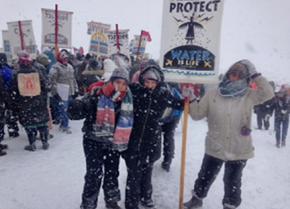The blizzard didn’t stop us
SocialistWorker.org contributors and are part of a delegation of International Socialist Organization members who traveled to Standing Rock to bring solidarity to the struggle against the Dakota Access Pipeline (DAPL). In this report, they document the determination of the water protectors as the bitter cold of a North Dakota winter sets in.
A FURIOUS blizzard struck the Standing Rock encampments of the water protectors on Monday and Tuesday.
At the Oceti Sakowin Camp, tucked into a land basin by the Cannonball River, thick walls of snow and biting, ferocious winds shook every tent and dwelling, leveling several structures and burying dozens of cars.
Still, more than a thousand water protectors led by Native elders and military veterans, marched to the DAPL barricades on Monday to show their strength and determination. Beyond the barricades, private security and law enforcement had set up camp near the river, where they struggle to prevent an ice bridge from forming.
The marchers stood together in the near-zero degree temperatures and gale-force winds, struggling to stay upright, while drums and chants rang out, and veterans yelled impassioned speeches to make themselves heard over the wind.
THE TEMPERATURES dropped and the blizzard intensified throughout Monday evening and into Tuesday, raising concerns among the protectors about each other's safety.

An elder and veteran returning from march slipped on black ice and was carried away injured on a makeshift stretcher by a team of medics, who fortunately arrived within seconds.
Scores of spontaneously organized people gathered on the sides of the camp roads to push cars out of ditches, shovel snow, and help the old and young to cross safely.
The medics were quick to respond to the plummeting temperature. They set up ad hoc tents across the camp alongside existing ones. All night long, medic cars drove through Oceti Sakowin, checking in on every dwelling and marking those that were safe with red x's made of tape.
One of our comrades was approached while waiting for the bathroom by a team of medics, asking if she was okay and had a place to go. We later heard that two of these dedicated volunteers suffered hypothermia during the blizzard.
Meanwhile in kitchens across the camp, dinner was being prepared for several thousand activists, veterans, elders and staffers.
At the main mess hall, near the sacred fire, volunteer cooks, including a fellow ISO member, made sloppy joes, lentil soup and fried dough. The powerful gusts rattled the frames of the hall back and forth, forcing people to speak loudly over the howling wind and to huddle close together to stay warm.
Despite all this, the atmosphere remained friendly and lighthearted, which helped the camp respond to the influx of the injured and sick.
In another kitchen five more ISO activists stood around a steel table chopping vegetables for a goulash. Concerns over a shortage of water were quickly dealt with when several volunteers gathered freshly fallen snow to use for dishwashing.
Over the sound of sizzling meat and veterans chatting by the kitchen fire, discussions about what lay head for the struggle went on into the night.
The overwhelming majority of people we spoke to--and we spoke to dozens upon dozens--felt that even after the decision by the U.S. Army Corps of Engineers this weekend to deny a necessary permit to the DAPL's builders, the pipeline would be built anyway unless we continued to run the resistance camps through the winter.
In the mess halls and kitchens, on the icy roads, in lines for the bathrooms, on marches and on construction projects, water protectors spoke about how this fight is far from over. People believe that Energy Transfer Partners would keep drilling without a permit, in defiance of the federal government--and that the incoming Trump administration would take their side.
Some, however, are apprehensive about maintaining the camps during the fierce winter now that the Army Corps has issued a statement against the pipeline.
Sleeping through the night was nearly impossible. The wooden frame of our canvas tent shook violently for hours, and we were afraid it might collapse. An elderly couple we met did have their structure snap. They were treated by medics and sent to the communal sleeping areas set up for those whose shelters are no longer safe.
But the camp made it until morning. The crowds began to assemble again to prepare for a new day.


